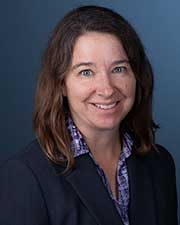Two KU Engineering Professors Recognized for Early Career Research Success
Two assistant professors from the University of Kansas School of Engineering have received prestigious national awards granted to early-career faculty whose research shows promise.
Amy Hansen and Admin Husic, who are each assistant professors in the Department of Civil, Environmental & Architectural Engineering, each received National Science Foundation Career Development (CAREER) awards. Research for both professors focuses on water quality and water resources.
“These awards expand the KU School of Engineering’s research capabilities in an area critical to a sustainable future,” said Dean of Engineering Mary Rezac. “This early-career recognition also showcases the excellence of KU Engineering faculty.”
About the Research
Amy Hansen
 Assistant Professor of Civil, Environmental and Architectural Engineering Amy Hansen’s research focuses on the ability of wetlands to improve water quality by removing nitrate. She received a five-year, $577,000 grant from the National Science Foundation Early Career Development (CAREER) award for work to understand the role of vegetation in nitrogen exchange and removal in riparian wetlands.
Assistant Professor of Civil, Environmental and Architectural Engineering Amy Hansen’s research focuses on the ability of wetlands to improve water quality by removing nitrate. She received a five-year, $577,000 grant from the National Science Foundation Early Career Development (CAREER) award for work to understand the role of vegetation in nitrogen exchange and removal in riparian wetlands.
Hansen wants to clarify the conditions under which wetlands and floodplains can have a positive effect on water quality, especially when fast-moving rivers are sending nitrogen- and sediment-laden flows into the riparian acreages. The wetlands, filled with vegetation, allow such flows to slow significantly and even to pool, thus changing the chemistry of the local environment.
During periods of heavy rain, nitrogen from fertilizers runs from farm fields into streams and rivers. Such nitrate then can harm the local ecosystem and challenge the quality of water supplies.
Hansen’s previous research has shown that riparian wetlands can help improve water quality significantly. With the CAREER grant, she wants to document and specify the conditions under which such improvements are delivered, so that the information can help guide wetlands construction and management.
“This project responds to a scientific and societal need to generalize our understanding of the potential for riparian wetlands to mitigate impaired water quality under the expanding local, national and global footprint of agriculture,” Hansen said.
CAREER awards are considered among the NSF’s most prestigious. The awards are given annually to about 500 early-career faculty who have the potential to serve as academic role models in both research and education. NSF expects recipients’ activities to build a firm foundation for a lifetime of leadership in integrating education and research.
Hansen, who joined the KU faculty in 2018, plans for the research to extend into learning, both on campus and in the field. She plans to engage KU students in the work through experiential learning in classes such as CE 756: Wetland Hydrology, and to generate community engagement through collaboration with Baker Wetlands at the southern edge of Lawrence.
Her team will gather observational data, detailing how much and how fast water flows into wetlands, and how long it remains. Field experiments on wetland vegetation will measure the effect of water velocity and vegetation on rates of nitrogen transformation. Mathematical models then will be created to explain whether local-scale interactions can explain larger patterns in nitrogen removal.
The goal is to gain new information, change education and outreach and, ultimately, make a difference in water quality.
“My research has sparked a lot of interest from people who are invested in improving water quality and quantifying the ecosystem services that wetlands could provide,” Hansen said. “I hope that this new study transforms our understanding of how riparian wetlands can contribute to nitrate removal and informs new approaches that incorporate wetlands into water resource management and planning in agricultural landscapes.”
Admin Husic
 Assistant Professor of Civil, Environmental and Architectural Engineering Admin Husic’s research examines how humans have and will affect natural water systems. He was awarded a five-year, $609,000 grant from the National Science Foundation Early Career Development (CAREER) award for his efforts to document and share what he describes as “dynamic connectivity: a research and educational frontier for sustainable environmental management under climate and land use uncertainty.”
Assistant Professor of Civil, Environmental and Architectural Engineering Admin Husic’s research examines how humans have and will affect natural water systems. He was awarded a five-year, $609,000 grant from the National Science Foundation Early Career Development (CAREER) award for his efforts to document and share what he describes as “dynamic connectivity: a research and educational frontier for sustainable environmental management under climate and land use uncertainty.”
Husic is working to understand how landscapes adjust as they direct water — and the sediment and nutrients that it carries — to rivers. If efforts to manage shared water resources are to be successful, he said, it will be critical to understand the role that humans play in affecting such timeless connections.
He sees two questions driving the work: ‘How have humans changed the landscapes around us for the worse, and how are we able to manage them for the better?”
“Water is such a basic necessity — not just for humans but for all living things on Earth,” Husic said. “However, in many places throughout the world, water is often lacking — either in its quantity or quality. I’m motivated by a desire to ensure its availability and safety for people.”
CAREER awards are considered among the NSF’s most prestigious, given annually to about 500 early-career faculty with the potential to serve as academic role models in research and education. NSF expects recipients’ activities to build a firm foundation for a lifetime of leadership in integrating education and research.
Husic’s work aims to bring a new, dynamic approach to traditionally qualitative, static assessments of the connectivity of hydrologic systems throughout the United States. His team will look back in time and leverage high-frequency aquatic sensors for nitrate and turbidity in more than 150 rivers, using the data to train a deep learning model. Dynamic connectivity will be expressed through mathematics, revealing dominant pathways of connection. Machine learning will link how attributes of the landscape affect river quality, and a web application will help determine the potential for using dynamic connectivity as a management tool.
“This work will provide us with a set of predictive tools that will indicate where, when and how water quality is deteriorated,” Husic said, noting that the work will attempt to answer a number of critical questions. Among them: “Can dynamic landscape connectivity be strategically managed to confer ecosystem benefits while maintaining societal demands?”
Husic, who joined the KU faculty in 2018, leads a research lab of undergraduate and graduate students developing models and systems that can be used train the next generation of engineers and policymakers “to be good stewards,” he said, of humanity’s shared and changing human-environment systems.
“The CAREER award will act as a springboard for achieving our lab’s goals and will set us up for success — not only in the next five years, but for the decades to come as land use and climate change intensify and bring new water challenges,” Husic said.